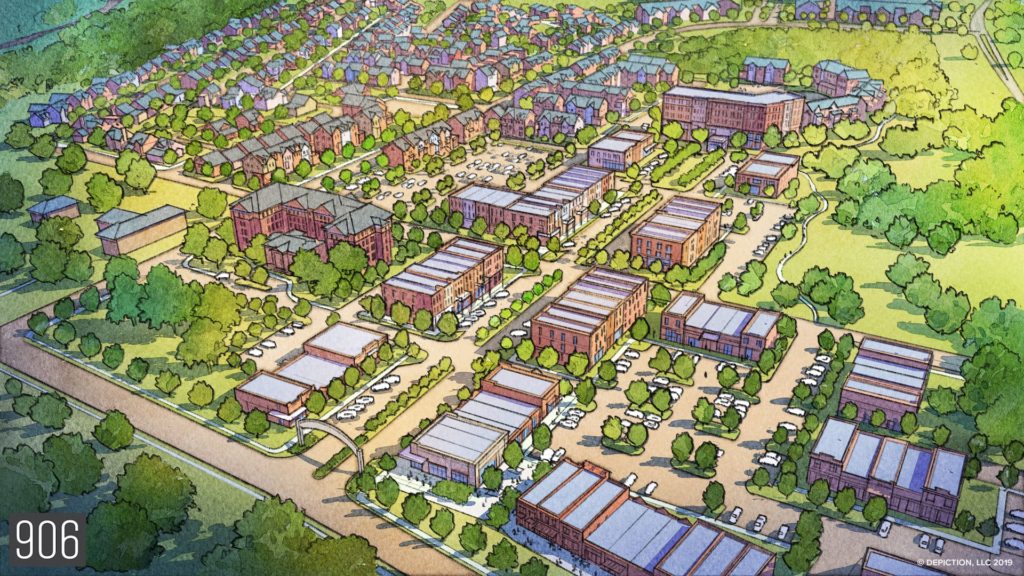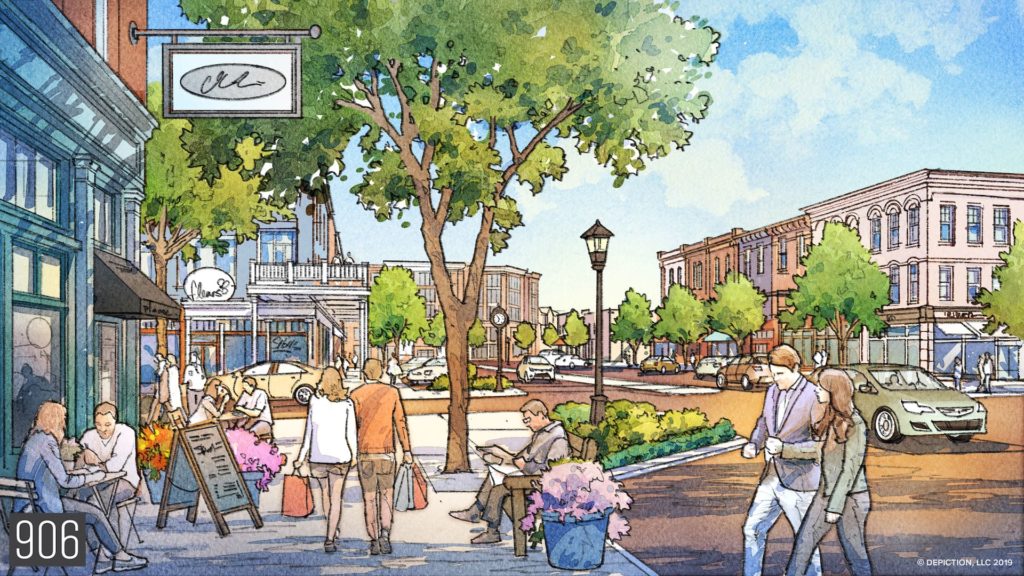102-acre multi-use project planned for former Tennessee Children’s Home property
By ALEXANDER WILLIS September 18, 2019 Original Article posted here.
After months of deliberations through city and community meetings, the Spring Hill Board of Mayor and Aldermen on Monday night approved the second and final reading of Ordinance 19-25, setting the stage for the development of a bustling downtown district.
Proposed to be built on the current site of the Tennessee Children’s Home and consisting of 102 acres of commercial, restaurant, office, hotel and residential development, the project – now known as Kedron Square – has seen multiple revisions as talks continued between the developer and the community at large. Among the latest changes is a 65 percent increase in green space from what had been initially proposed, as well as a reduction in the residential portion of development by 10 percent.
The project includes some self-imposed restrictions to help attract desirable restaurants, such as the stipulation that restaurants can only have, at most, 15 franchises anywhere throughout the state of Tennessee – meaning a McDonald’s or Burger King won’t be finding its way into Kedron Square. The development will also include an eight-acre park and historical markers to note the site’s history and is projected to generate roughly $100 million for the city over a20-year period.
Shortly after reaching the item during Monday’s meeting, Alderman Dan Allen proposed seven amendments to the project as it was presented. The first four were what Allen called “cleanup” amendments and were designed to only “plug up some holes” and clean up the language of the resolution. The remaining three amendments were to remove drive-through lanes and retail liquor stores as permitted uses and to only allow wineries and breweries with a special use that would require developers to seek additional approval from the city beforehand.
The board voted unanimously to approve the drive-throughs amendment. While some board members appeared torn on the topic, Allen, Hazel Nieves and John Canepari all reflected on the recent denial of a drive-through for the Fainting Goat coffee shop on the grounds that the area wasn’t zoned to include the amenity. Board members argued that it wouldn’t be fair to grant exceptions for one applicant over another.
Sentiment on the second major amendment, which would see the removal of liquor stores asa permitted use, wasn’t as unanimous among the board.
“Just my opinion, having a retail liquor store with the way this development has been described and put together… personally, I just don’t feel like that fits in there,” Allen said.“We’ve got plenty of liquor stores around town.”
Allen also brought up the fact that the city only allows one liquor store per every 10,000residents. With four liquor stores and just over 41,000 people, Spring Hill is a ways off before a fifth liquor store could even be approved, Allen argued in support of his amendment.
Ultimately, every member of the board except Alderman Vincent Fuqua voted to approve the amendment on restricting liquor stores in the development.
Allen’s proposal to only allow breweries, wineries and other alcohol-serving businesses with special use saw even more deliberation from the board. Allen explained that the amendment would, under no circumstances, actually restrict such businesses from being a part of the project. Rather, it would require the developer to receive an extra layer of approval on a case-by-case basis, giving the city some additional control over which businesses are approved.
Ultimately, the amendment was approved by the board, with Alderman Fuqua, Matt Fitterer and Jeff Graves voting against it.
Despite the ambition of the project, it hasn’t been without its critics. Vice Mayor Amy Wurth has been consistent in her belief that the city should not entertain such a large-scale project until it can adequately fund its fire and police forces and provide an adequate transportation infrastructure. Some residents have opposed the project as well, citing traffic and historical preservation concerns, with an online petition against the project collecting more than 550signatures.
“So I’ll take the opposing position — I will not be supporting this tonight,” Wurth said. “The reason being, I think Alderman Allen did a good job outlining the special uses that have been required versus permitted under this development, [as well as] the overall impact this will have on the city itself.”
Despite its critics, the project also has plenty of support, both from residents and city leaders alike. And ultimately, the board did vote in favor of approving the project’s preliminary plan with a vote of 6 – 2, with Aldermen Canepari, Fitterer, Nieves, Kevin Gavigan, Graves andFuqua voting in favor of, and Aldermen Wurth and Allen voting against.
With a projected buildout period of 10 years, residents may not see their bustling downtown come to fruition any time soon. But when it happens, those who remember will be able to point to this vote as when it all officially began.
Featured images above and below show renderings of future Kedron Square.


Article reposted with permission from Nashville Post.
